无锡商业职业技术学院《实用英语1》清考复习资料
- 格式:doc
- 大小:51.50 KB
- 文档页数:5
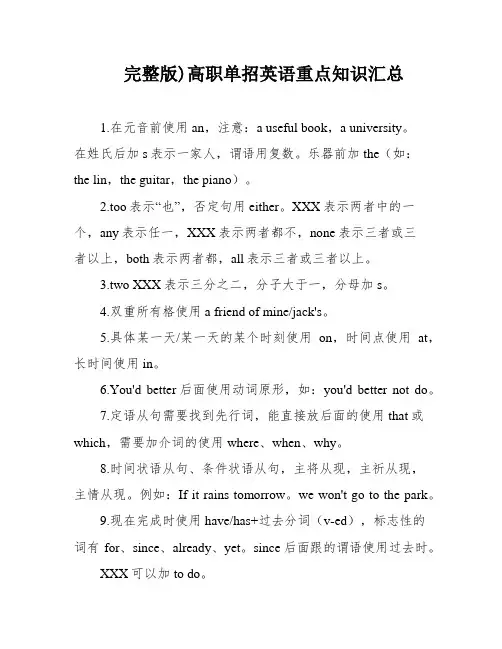
完整版)高职单招英语重点知识汇总1.在元音前使用an,注意:a useful book,a university。
在姓氏后加s表示一家人,谓语用复数。
乐器前加the(如:the lin,the guitar,the piano)。
2.too表示“也”,否定句用either。
XXX表示两者中的一个,any表示任一,XXX表示两者都不,none表示三者或三者以上,both表示两者都,all表示三者或三者以上。
3.two XXX表示三分之二,分子大于一,分母加s。
4.双重所有格使用a friend of mine/jack's。
5.具体某一天/某一天的某个时刻使用on,时间点使用at,长时间使用in。
6.You'd better后面使用动词原形,如:you'd better not do。
7.定语从句需要找到先行词,能直接放后面的使用that或which,需要加介词的使用where、when、why。
8.时间状语从句、条件状语从句,主将从现,主祈从现,主情从现。
例如:If it rains tomorrow。
we won't go to the park。
9.现在完成时使用have/has+过去分词(v-ed),标志性的词有for、since、already、yet。
since后面跟的谓语使用过去时。
XXX可以加to do。
11.whose后面一定加名词。
12.XXX表示禁止,用must提问,否定回答使用needn't或don't have to。
13.few可数,几乎没有;a few可数,一些;little不可数,几乎没有;a little不可数,一些。
14.听hear、观see、watch、感feel、使make、have、让let、帮help后面跟原形动词或v-ing(表示正在进行的动作)。
被动语态中to要还原。
15.被动语态使用be+过去分词(v-ed),现在进行时使用be+v-ing。
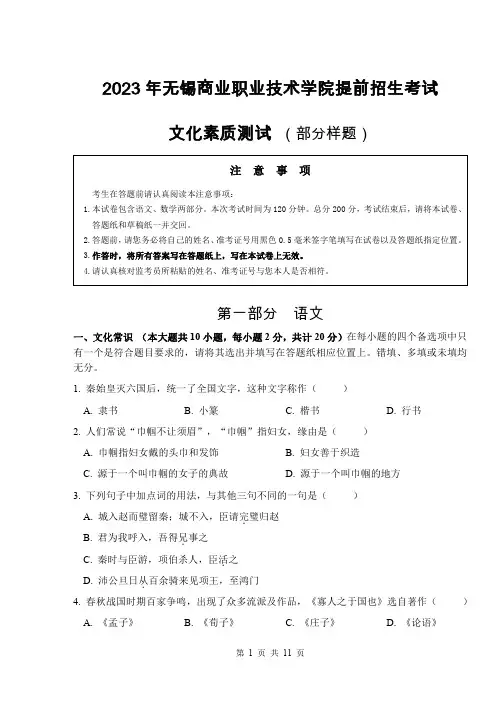
2023年无锡商业职业技术学院提前招生考试文化素质测试(部分样题)注意事项考生在答题前请认真阅读本注意事项:1.本试卷包含语文、数学两部分。
本次考试时间为120分钟。
总分200分,考试结束后,请将本试卷、答题纸和草稿纸一并交回。
2.答题前,请您务必将自己的姓名、准考证号用黑色0.5毫米签字笔填写在试卷以及答题纸指定位置。
3.作答时,将所有答案写在答题纸上,写在本试卷上无效。
4.请认真核对监考员所粘贴的姓名、准考证号与您本人是否相符。
第一部分语文一、文化常识(本大题共10小题,每小题2分,共计20分)在每小题的四个备选项中只有一个是符合题目要求的,请将其选出并填写在答题纸相应位置上。
错填、多填或未填均无分。
1.秦始皇灭六国后,统一了全国文字,这种文字称作()A.隶书B.小篆C.楷书D.行书2.人们常说“巾帼不让须眉”,“巾帼”指妇女,缘由是()A.巾帼指妇女戴的头巾和发饰B.妇女善于织造C.源于一个叫巾帼的女子的典故D.源于一个叫巾帼的地方3.下列句子中加点词的用法,与其他三句不同的一句是()A.城入赵而璧留秦;城不入,臣请完.璧归赵B.君为我呼入,吾得兄.事之C.秦时与臣游,项伯杀人,臣活.之D.沛公旦日从.百余骑来见项王,至鸿门4.春秋战国时期百家争鸣,出现了众多流派及作品,《寡人之于国也》选自著作()A.《孟子》B.《荀子》C.《庄子》D.《论语》5.姚鼐《登泰山记》“戊申晦,五鼓,与子颍坐日观亭”中“晦”是指()。
A.农历每月第一天B.农历每月最后一天C.农历每月十五日D.农历每月十六日6.下列有关文学常识的表述,不正确的一项是()。
A.《汉书》是我国第一部纪传体通史,二十四史之一,东汉史学家班固编撰B.苏轼,北宋文学家,唐宋八大家之一,与父亲苏洵、弟弟苏辙齐名,合称“三苏”C.《逍遥游》《滕王阁序》《西厢记》分别是庄周、王勃、王实甫的作品D.《诗经》中的“国风”和《楚辞》中的《离骚》,在文学史上并称为“风骚”7.《雷雨》是现代剧作家曹禺的代表作,下列选项中不属于《雷雨》剧中人物的是()。

英语第一册笔记Unit11、音标(48个)a university以辅音发音开头用a/ju:/以元音发音开头用an音节:一个元音加若干个辅音2、family name姓last namegiven name名first name3、graduate v.毕业于,从……毕业n.大学毕业生graduate from毕业于4、call v.称呼,把……称作call+宾+宾补(常用为名词)call sb sthcall on sb1拜访某人call at sp2参观某地call for号召5、hope n./v.希望+that从句(一般将来时)hope for+n.to do sth3+that从句(虚拟语气)wishsb to do sthwish可跟双宾语suggest v.suggest sth.(to sb)向某人建议建议suggest(sb)doing sth建议(某人)做某事suggest+that从句虚拟语气(sb(should)do)1sb:somebody某人2sp:someplace某地3sth:something某事暗示;表明suggest+that从句(用虚拟语气)suggestion[c]make a suggestion/make suggestionseg4:The teacher suggested that we(should)go to sleep and get up early.The doctor made a suggestion that I should drink more water.I hope that we will go to the college3years later.I wish I would go to the space one day.6、east easternwest n.western adj.south southernnorth northernthe south of在……南部the southern part of在东方in the east在……的东部in the eastern part of……7、enjoy oneself5=have a good time4eg:exempli gratia例子,例如5enjoy yourself:自便多用于餐桌,家里有人拜访主人客气话8、enjoy弱likelove+doing sthbe fond of强be keen onbe crazy about9、Nice/Glad to meet you!=Nice meeting you!=How do you do!——How are you?——Fine,thank you.And you?——How is everything with you?/What up?——Very well.Please give my regards to……请代我向××问好Please remember me to……10、①——Thank you!——It's a pleasure./My pleasure.不用谢②——Can you give me a hand to carry the box?——With pleasure.很乐意。
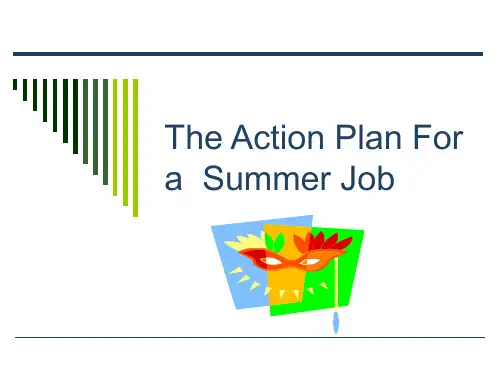
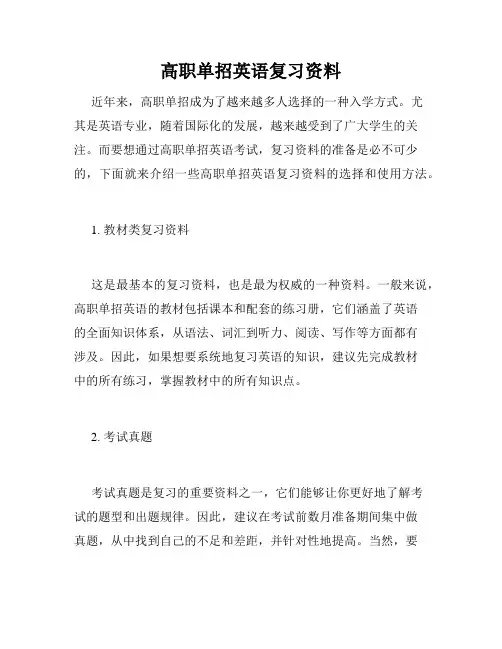
高职单招英语复习资料近年来,高职单招成为了越来越多人选择的一种入学方式。
尤其是英语专业,随着国际化的发展,越来越受到了广大学生的关注。
而要想通过高职单招英语考试,复习资料的准备是必不可少的,下面就来介绍一些高职单招英语复习资料的选择和使用方法。
1. 教材类复习资料这是最基本的复习资料,也是最为权威的一种资料。
一般来说,高职单招英语的教材包括课本和配套的练习册,它们涵盖了英语的全面知识体系,从语法、词汇到听力、阅读、写作等方面都有涉及。
因此,如果想要系统地复习英语的知识,建议先完成教材中的所有练习,掌握教材中的所有知识点。
2. 考试真题考试真题是复习的重要资料之一,它们能够让你更好地了解考试的题型和出题规律。
因此,建议在考试前数月准备期间集中做真题,从中找到自己的不足和差距,并针对性地提高。
当然,要注意,过度依赖考试真题容易导致不敢尝试新的知识点和题型,因此需要注意平衡。
3. 视频课程类随着网络技术的不断进步,视频课程已经成为了越来越多人的选择。
英语课程内容的在线视频教育机构也越来越多,例如VIPABC、沪江等,它们提供了更加生动、丰富的教学资源和学习社区环境。
如果你喜欢听课,有时间经常查看网络,那么视频课程是你的不二之选。
4. 辅助类书籍辅助类书籍可以帮助你更好地理解英语的知识和技能。
例如语法书、单词书、阅读理解书、听力训练书等。
选择合适的辅助类书籍,可以让你在复习知识的同时获得更多的复习策略和技巧,帮助你更好地准备考试。
5. 整理笔记考试前的两个月是非常重要的时期,可以把之前学习的知识点,词汇等重新过一遍。
复习的过程中,可以整理笔记,把重点、难点以及自己容易出错的地方进行整理和归类,加深对所学知识的了解和记忆。
综上所述,高职单招英语考试的复习资料可以从多方面入手。
不同的复习资料可以提供不同的价值,你可以根据自己的实际情况进行选择和使用,掌握更有效的学习方法和技巧,努力提高自己的英语水平。
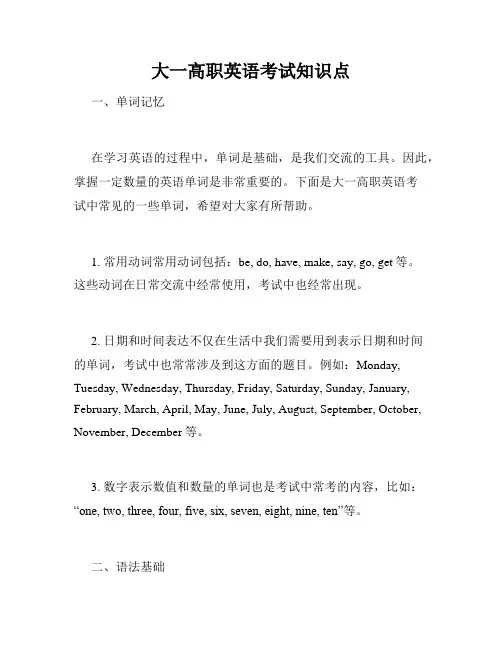
大一高职英语考试知识点一、单词记忆在学习英语的过程中,单词是基础,是我们交流的工具。
因此,掌握一定数量的英语单词是非常重要的。
下面是大一高职英语考试中常见的一些单词,希望对大家有所帮助。
1. 常用动词常用动词包括:be, do, have, make, say, go, get等。
这些动词在日常交流中经常使用,考试中也经常出现。
2. 日期和时间表达不仅在生活中我们需要用到表示日期和时间的单词,考试中也常常涉及到这方面的题目。
例如:Monday, Tuesday, Wednesday, Thursday, Friday, Saturday, Sunday, January, February, March, April, May, June, July, August, September, October, November, December等。
3. 数字表示数值和数量的单词也是考试中常考的内容,比如:“one, two, three, four, five, six, seven, eight, nine, ten”等。
二、语法基础1. 基本句型英语语法中有一些常见的句型,比如:主语 + 谓语动词,主语 + 系动词 + 表语,主语 + 及物动词 + 宾语,主语 + 不及物动词等。
2. 时态和语态英语时态是英语语法中非常重要的一部分,常见的时态有:一般现在时,一般过去时,一般将来时,现在进行时,过去进行时,现在完成时等。
英语语态有主动语态和被动语态之分。
三、阅读理解大一高职英语考试中,阅读理解是一个重要的部分。
下面是一些阅读理解的技巧和常见题型:1. 浏览文章首先,要快速浏览整篇文章,了解文章的主题和结构。
2. 理解关键词在阅读文章时,要注意理解关键词,这样可以更好地理解全文。
3. 掌握一些常见词汇和短语考试中经常出现一些常见的词汇和短语,比如:“however, therefore, in addition, on the other hand”等。
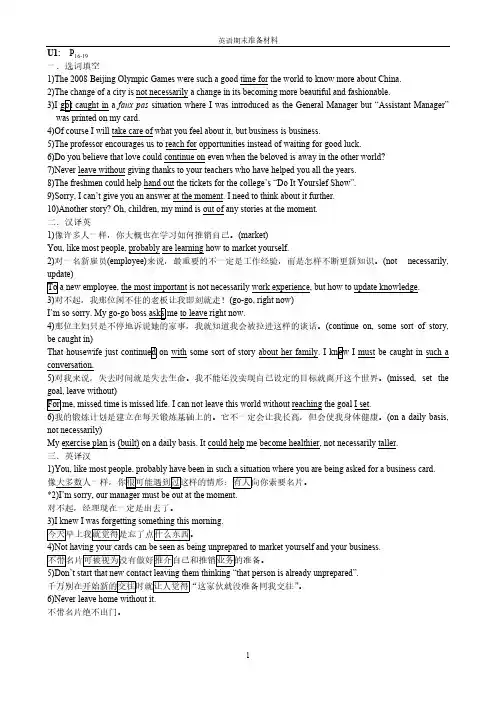
1)The 2008 Beijing Olympic Games were such a good time for the world to know more about China.2)The change of a city is not necessarily a change in its becoming more beautiful and fashionable.3)I got caught in a faux pas situation where I was introduced as the General Manager but “Assistant Manager” was printed on my card.4)Of course I will take care of what you feel about it, but business is business.5)The professor encourages us to reach for opportunities instead of waiting for good luck.6)Do you believe that love could continue on even when the beloved is away in the other world?7)Never leave without giving thanks to your teachers who have helped you all the years.8)The freshmen could help hand out the tickets for the college’s “Do It Yourslef Show”.9)Sorry, I can’t give you an answer at the moment. I need to think about it further.10)Another story? Oh, children, my mind is out of any stories at the moment.二.汉译英1)像许多人一样,你大概也在学习如何推销自己。
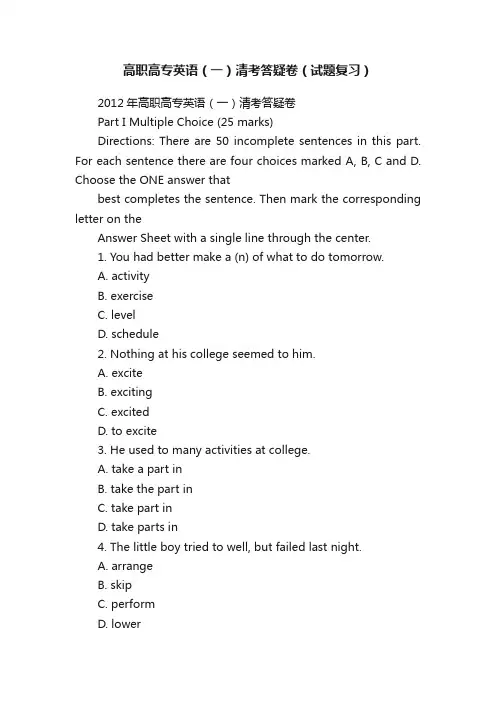
高职高专英语(一)清考答疑卷(试题复习)2012年高职高专英语(一)清考答疑卷Part I Multiple Choice (25 marks)Directions: There are 50 incomplete sentences in this part. For each sentence there are four choices marked A, B, C and D. Choose the ONE answer thatbest completes the sentence. Then mark the corresponding letter on theAnswer Sheet with a single line through the center.1. You had better make a (n) of what to do tomorrow.A. activityB. exerciseC. levelD. schedule2. Nothing at his college seemed to him.A. exciteB. excitingC. excitedD. to excite3. He used to many activities at college.A. take a part inB. take the part inC. take part inD. take parts in4. The little boy tried to well, but failed last night.A. arrangeB. skipC. performD. lower5. you come here, you will get.A. The earlier… the moreB. The earlier… moreC. Earlier… the moreD. Earlier… more6. Nobody knew how to such a problem.A. stress overB. get well-organizedC. hang outD. deal with7. We all the police in their work against crime.A. supportB. respectC. expandD. defend8. You should avoid her in the street.A. meetB. meetingC. to meetD. to meeting9. We all see the problem as .A. difficult to solveB. it difficult to solveC. it is difficult to solveD. to be difficult to solve10. The girl student didn’t like any of exercise.A. aweB. formC. troubleD. thing11. Dr. Smith his wife to drive him back home that day.A. expectedB. hopedC. thoughtD. spoke12. You will have to arrive there on time, you will miss a good chance.A. but soB. but alsoC. or soD. or else13. the family came here from Russia, they were poor.A. As ifB. WhileC. UnlessD. When14. His parents used to be very to him when he was at high school.A. frequentB. involvedC. demandingD. comfortable15. Those old songs could bring back people’s .A. lifetimeB. ageC. memoriesD. areas16. You made me like I was one of your family members.A. soundB. feelD. taste17. Mr. White could only apologize to me that accident.A. forB. throughC. inD. about18. The librarian will how to use the system.A. speakB. commentC. explainD. apologize19. Jane would come to New York and into a hotel.A. agreeB. checkC. bringD. call20. The price for the hotel breakfast.A. costsB. includesC. needsD. asks21. You will be met on arrival at the airport and to your hotel.A. transferredB. walkedC. tookD. stayed22. The thing to do would be to rest until you feel better.A. sensibleB. uniqueD. polite23. I have no idea the television isn’t working.A. whatB. whichC. howD. why24. It was a difficult time, but finally everything to be all right.A. worked outB. turned outC. hung outD. thought out25. go straight on to university, why not get some work experience first?A. Rather thanB. More thanC. Less thanD. Other than。
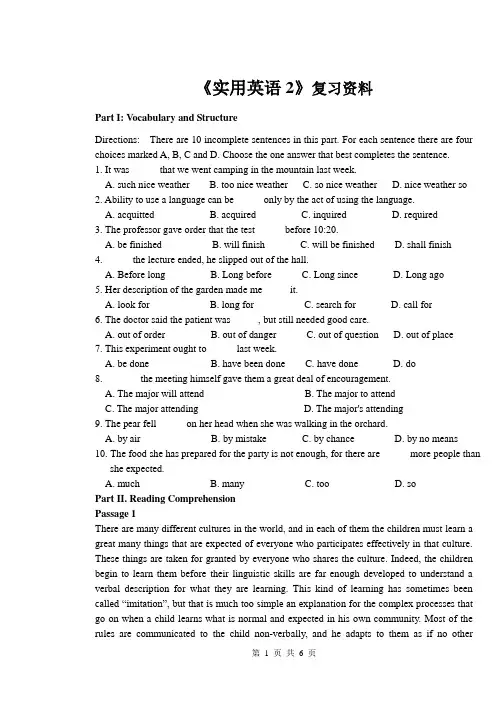
《实用英语2》复习资料Part I: Vocabulary and StructureDirections: There are 10 incomplete sentences in this part. For each sentence there are four choices marked A, B, C and D. Choose the one answer that best completes the sentence.1. It was _____ that we went camping in the mountain last week.A. such nice weatherB. too nice weatherC. so nice weatherD. nice weather so2. Ability to use a language can be _____ only by the act of using the language.A. acquittedB. acquiredC. inquiredD. required3. The professor gave order that the test _____ before 10:20.A. be finishedB. will finishC. will be finishedD. shall finish4. _____ the lecture ended, he slipped out of the hall.A. Before longB. Long beforeC. Long sinceD. Long ago5. Her description of the garden made me _____it.A. look forB. long forC. search forD. call for6. The doctor said the patient was _____, but still needed good care.A. out of orderB. out of dangerC. out of questionD. out of place7. This experiment ought to _____ last week.A. be doneB. have been doneC. have doneD. do8. _____ the meeting himself gave them a great deal of encouragement.A. The major will attendB. The major to attendC. The major attendingD. The major's attending9. The pear fell _____ on her head when she was walking in the orchard.A. by airB. by mistakeC. by chanceD. by no means10. The food she has prepared for the party is not enough, for there are _____ more people thanshe expected.A. muchB. manyC. tooD. soPart II. Reading ComprehensionPassage 1There are many different cultures in the world, and in each of them the children must learn a great many things that are expected of everyone who participates effectively in that culture. These things are taken for granted by everyone who shares the culture. Indeed, the children begin to learn them before their linguistic skills are far enough developed to understand a verbal description for what they are learning. This kind of learning has sometimes been called “imitation”, but that is much too simple an ex planation for the complex processes that go on when a child learns what is normal and expected in his own community. Most of the rules are communicated to the child non-verbally, and he adapts to them as if no otherpossibilities existed. They are as much a part of him as his own body, he would no more question them than he would question the fact that he has two hands and two feet, but only one head.21. Children have to learn a large number of things which ______ in their culture.A. are difficult for them to learnB. are regarded as especially important for themC. are taken as normal by everyoneD. are expected for them to learn22. Children begin to learn things by ______.A. using their linguistic skillsB. understanding what they are learningC. communicating effectivelyD. imitating what others are doing23. The learning processes for the children are _____.A. complexB. simpleC. normalD. skillful24. Children accept the communication rules ______.A. thoughtfullyB. unconsciouslyC. cautiouslyD. choosingly25. Which of the following statements is correct?A. Children always ask why they have two hands.B. Children learn all that they are expected through imitation.C. Children learn things faster than adults.D. Children adapt to the communication rules naturally.Passage 2Almost every family buys at least one copy of a newspaper every day. Some people subscribe to as many as two or three different newspapers. But why do people read newspapers?Five hundred years ago, news of important happenings – battles lost and won, kings or rulers overthrown or killed – took months and even years to travel from one country to another. The news passed by word of mouth and was never accurate. Today we can read in our newspapers of important events that occur in faraway countries on the same day they happen.Apart from supplying news from all over the world, newspapers give us a lot of other useful information. There are weather reports, radio, television and film guides, book reviews, stories and of course advertisements. There are all sorts of advertisements. The bigger ones are put in by large companies to bring attention to their products. They pay the newspapers thousands of dollars for their advertising space, but it is worth the money, for news of their products goes into almost every home in the country. For those who produce newspapers, advertisements are also important. Money earned from advertisements makes it possible for them to sell their newspapers at a low price and still make a profit.26. The habit of reading newspapers is ____.A. widespreadB. found among a few familiesC. not popularD. uncommon27. In the past, news was ____.A. sent by telegraphB. sent by letterC. passed from one person to anotherD. sent by telephone28. The money spent on advertisements is ____.A. worthwhileB. not muchC. wastedD. of no use to anyone29. Which of the following statements is not true?A. Five hundred years ago news did not take a long time to reach other countries.B. Large companies put big advertisements on the newspapers to make their products known.C. The news that we need in our newspapers is up-to-date.D. Though the newspapers are sold a low price, their owners still gain profit.30. The phras e “subscribe to” in the second sentence means ____.A. contribute toB. write toC. pay for receivingD. appreciatePassage 3Few Americans remain in one position or one place for a lifetime. We move from town to city to suburb, from high school to college in a different state, from a job in one region to a better job elsewhere, from the home where we raise our children to the home where we plan to live in retirement. With each move we are forever making new friends, who become part of our new life at that time.For many of us summer is a special time for forming new friendships. Today millions of Americans vacation abroad, and they go not only to see new sights but also with the hope of meeting new people. No one really expects a vacation trip to produce a close friend, but the beginning of a friendship is possible.The word “friend” can be applied to a wide range of relationships to someone one has known for a few weeks in a new place, to a fellow worker, to a childhood playmate, to a man or woman, to a trusted confidant.31. Many Americans move from place to place for the following reasons except ______.A. going to collegeB. getting a better jobC. finding a place to live in retirementD. saving money32. Summer is a special time when many Americans ______.A. enjoy the sunlightB. feel strangeC. travel to other countriesD. get a new job33. When summer comes, many Americans ______.A. hope to meet new peopleB. expect to find some close friendsC. want to begin lasting friendships with new peopleD. Both A and B34. From the passage it can be seen that a “friend” can be ______.A. a fellow workerB. a football teammateC. a boy or a girlD. all of the above35. Which of the following is the topic sentence of the second paragraph?A. For many of us summer is a special time for forming new friendships.B. Today millions of Americans vacation abroad.C. No one really expects a vacation trip to produce a close friend.D. But surely the beginning of friendship is possible.Passage 4Television, or TV appeared for the first time in 1939, and did not become common until early 1950s. Since then it has more changed our life and society. Today, TV has become a part of our daily life.Television has changed information. It not only gives the news quickly, but also shows it in pictures--- more interesting and lively than words. No newspaper has ever reached so many people and shown so clearly what is happening right now in their countries and everywhere else. It can be said that TV has brought reality and opened windows in everybody’s life. Television helps business and factories sell their products to millions of people. Pictures of many new products are often flashed on the TV screen and one can know where to buy what he is interested in.Turn on the TV set and you can learn different subjects over the set without leaving your house. Teaching can be given on TV easily to thousands of students in different places.36.Few people could have a TV set in 1944 because _______.A. they were too poor to buy oneB. the World War Two was going onC. there were few TV set factoriesD. TV didn’t change their life37. People may get to know what has happened through _______.A. TVB. radioC. newspaperD. all the above38. TV has become a part of our life because _______.A. it shows news in picturesB. people in different places can learn over TVC. TV is more and more helpful to both sellers and buyersD. TV is better used in more ways39. _______ examples are given in the passages to prove that TV is a part of our daily life.A. TwoB. ThreeC. FourD. Five40. Which may be the best to be the title of the passage?A. TV----A Part Of Our Life.B. TV Is Better Than Newspaper.C. Watch TV.D. The Public’s Windows.Part III ClozeDirections: Fill the blanks by choosing the best answers.The elephant is the only animal in the world with a trunk. It uses its trunk _____ (41) many ways. It _____ (42) leaves off trees with its trunk and then puts them into its _____(43). It can even uses its trunk to pull up trees when it wants to make a path through a jungle. It also uses its trunk to get _____ (44). The trunk can hold a lot of it, _____(45) an elephant needs to drink more than three hundred pints of water every day. It has been easy for men to train elephants. All the elephants are considered useful in India _____ (46) for white elephants. They are used to carry heavy things for long distance in Indian forests. Many people say that some ancient Indian kings used to give white elephants to people they did not like. These white elephants were regarded as _____ (47) animals. They could not be made to work. They could not be killed and given _____ (48). A person who owned a white elephant had to _____(49) a lot of money to keep it properly. After a certain time, he usually became very _____(50). Nowadays people in England call a useless thing “a white elephant”.41. A. in B. with C. by D. of42. A. pushes B. pulls C. makes D. seizes43. A. tusks B. mouth C. body D. trunk44. A. leaves B. food C. grass D. water45. A. as B. when C. while D. so46. A. instead B. and C. except D. besides47. A. popular B. religious C. practical D. useful48. A. up B. in C. away D. off49. A. give B. beg C. receive D. spend50. A. poor B. rich C. tired D. disappointed复习答案。
![中职高职期末考试《实用英语》(18-19-1)期中考试卷[复制]选择题 客观题 期末试卷 试题和答案](https://uimg.taocdn.com/1390ba27a66e58fafab069dc5022aaea998f41f0.webp)
《实用英语》(18-19-1)期中考试卷[复制]班级 [单选题] *○18广告51班○18广告52班○18产品51班○18会计51班○18工商51班○18电商51班○18电商52班○18机电51班○18机电52班○18通信51班○18酒管31班○18物管51班○18汽修31班○18汽修32班○18汽修33班○18汽修34班○18数控51班○18数控52班姓名 [填空题] *_________________________________1. I'm _____ fat nor thin. [单选题] *A. neither(正确答案)B. eitherC. anyD. some2. Jackie can sing and play the piano, but I can do() . [单选题] *A. anyB. bothC. eitherD. neither(正确答案)3. Jack is () manager and he likes_____job very much. [单选题] *A.a,the(正确答案)B.the,theC.the,aD.a,a4. This company will get very busy () Sunday. [单选题] *A. on(正确答案)B. inC. atD. During5. —Do you have these shoes in size eight? —I’m not sure.I’ll just go and () out. [单选题] *A.sellB.sendC.watchD.find(正确答案)6. Lucy () ride a bike when she was three. [单选题] *A. shouldB.mustC.could(正确答案)D.need7. The book is ______. [单选题] *B.mine(正确答案)C. myD.of me8. —Mom,do I have to go to bed now? —Yes, you (). [单选题] *A.canB.willC.mayD.must(正确答案)9. ______ he got any reward? [单选题] *A.HaveB.HadC.HavingD.Has(正确答案)10. -Let me help you with your books. -(). [单选题] *A. You're very niceB. Yes,you're so helpfulC. No,I can doD. It's very kind of you(正确答案)11. – Thank you for coming to meet me. --(). [单选题] *A. I’m fineC. Nice to meet youD. My pleasure(正确答案)12. ----Hello, this is Linda speaking. May I speak to Jim? ----Yes, (). [单选题] *A. it isB.speaking(正确答案)C. I am JimD.that’s me13. --Would you like to go to the cinema with us tonight?-- ( ), but I don’t think I can afford the time.[单选题] *A.I’d like to(正确答案)B.I’d better goC.C. I didn’t want toD. I wouldn’t14. —Can I get you some more fish? —(). [单选题] *A.Yes, please(正确答案)B. I’m sorryC.That’s all rightD.It doesn’t matter15. Work hard() you will overcome the difficulties. [单选题] *A. and(正确答案)B soC butD for16. My boss said he didn’t mind () the window open at night. [单选题] *A. keepB. keeping(正确答案)C. to keepD. having kept17. I ______ some apples to share with you. [单选题] *A. havingB.hasC. have(正确答案)D. had18. There are seven ______ in a week. [单选题] *A. monthB. tdayC. days(正确答案)D. months19. Something is wrong ()my radio. [单选题] *A.forC.onD.with(正确答案)20. He is good at (). [单选题] *A.singing and danceB.singing and dancing(正确答案)C.sings and dancesD.sang and danced21. My brother is interested in () football. [单选题] *A.playB.playing(正确答案)C. playsD.played22. I get on well() my co-workers at work. [单选题] *A. with(正确答案)B. forC. byD.among23. We go to work by () bus. [单选题] *A. /(正确答案)B. aD. one24. My ()skirt is on the chair. [单选题] *A. sisters'sB. sisterC. sistersD. sister's(正确答案)25. There () some ____eating grass on the hill. [单选题] *A. is, sheepB. are, sheep(正确答案)C. are, sheepsD. is, sheeps26. () young should care for and help ____ old. [单选题] *A. The, aB. The, the(正确答案)C. A, theD. An, an27. May I () your new watch? [单选题] *A. look upB. have a look at(正确答案)C. look likeD. look after28. The little boy could not catch the () this morning, so he got to school late. [单选题] *A. trainB. truckC. jeepD. school bus(正确答案)29. Math(数学) ______ hard to learn. [单选题] *A. areB. beC. is(正确答案)D. were30. The first day of May is called () Day. [单选题] *A. HarborB. LaborC. Harbor’sD. Labor’s(正确答案)31. I’ll fly () Guangzhou _____ Beijing next Friday. [单选题] *A. not; untilB. both; andC. so; thatD. from; to(正确答案)32. This is an () book. [单选题] *A.interesting(正确答案)B.interestedC.interestD.interests33. She doesn’t go to school () her illness. [单选题] *A.becauseB.because of(正确答案)C.asD.since34. Are we going to the computer room ()? [单选题] *A.after a weekB.in two days(正确答案)C.two days awayD.two days later35. P.R.C is the ()People’s Republic of China. [单选题] *A.short form for(正确答案)B.form ofC.short from forD.from of36. —— How do you do? ——(). [单选题] *A.How do you do?(正确答案)B.How are you?C.Nice to meet you.D.I'm very well today.37. You can get a small gift () if you pay one more dollar. [单选题] *A.freeB.for free(正确答案)C.with freeD.on free38. My school is clean and ______. [单选题] *A.cameeefortfortable(正确答案)39. I am () in the book. [单选题] *A.interestingB.interested(正确答案)C.interestD.interests40. Thousands () people lost their lives in the earthquake(地震). [单选题] *B.forC.byD.of(正确答案)41. Can I pay () bank card? [单选题] *A.by(正确答案)B.onC.inD.at42. Dinosaurs (恐龙) disappeared () years ago. [单选题] *A.65 millionsB.65 million oflions of(正确答案)lion of43. There ______ a big stone in front of the door. [单选题] *A.is(正确答案)B.areC.beD. being44. There are many girls ______ in the classroom. [单选题] *A.dancing(正确答案)C. dancesD. danced45. _____ will be nice performances tonight. [单选题] *A.HasB. HereC. There(正确答案)D. Have46. There() five people in my family. [单选题] *A.isB.are(正确答案)C.amD.was47. I () a younger brother and a younger sister. [单选题] *A.have(正确答案)B.hasC.havingD.had48. My parents () workers in the same factory. [单选题] *A.isB.are(正确答案)C.beD.will be49. He wears () and has white ______. [单选题] *A.glass;toothB.glasses;toothC.glasses;teeth(正确答案)D.glasses;toothes50. My mother bought a lot of () yesterday. [单选题] *A.tomatoB.potatoes(正确答案)C.tomatosD.potatos51. We often do experiments in the () Room. [单选题] *A.TrainB.TrainsC.Training(正确答案)D.Trained52. If you like poetry, you may join the _____ Club. [单选题] * ATennisB.Poetry(正确答案)C.EnglishD.Cinema53. Don't waste your time and join us _____. [单选题] *A.immediateB.immediately(正确答案)C.dietD.die54. He is the famous scientist () will give us a lecture next Thursday. [单选题] *A.whyB.whichC.who(正确答案)D.whom55. I think my classmates are ______ to me. [单选题] *A.friendB.friendly(正确答案)C.friendshipD.friends56. The students in Class 2 are well-prepared () the final exam. [单选题] *A.for(正确答案)B.inC.onD.with57. They all avoid () that name. [单选题] *A.mentioning(正确答案)B.mentionedC.to mentionD.to be mentioned58. Can you have an appointment () them in this evening? [单选题] *A.toB.with(正确答案)C.atD.by59. If you () to the party, you’ll have a great time. [单选题] *A.will goB.wentC.go(正确答案)D.going60. I look forward to () abroad(国外)。
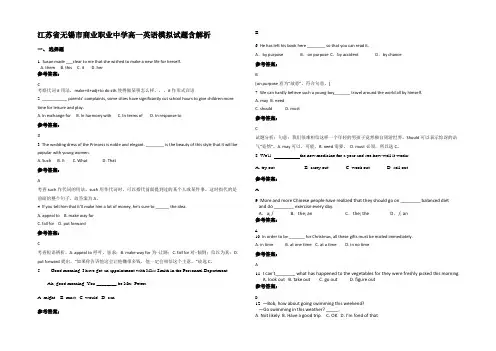
江苏省无锡市商业职业中学高一英语模拟试题含解析一、选择题1. Susan made ___clear to me that she wished to make a new life for herself.A. themB. thisC. itD. her参考答案:C考察代词it用法,make+it+adj+to do sth.使得做某事怎么样,,,it 作形式宾语2. ___________ parents’ complaints, some cities have significantly cut school hours to give children more time for leisure and play.A. In exchange forB. In harmony withC. In terms ofD. In response to参考答案:D3. The wedding dress of the Princess is noble and elegant. ________ is the beauty of this style that it will be popular with young women.A. SuchB. ItC. WhatD. That参考答案:A考查such作代词的用法。
such用作代词时,可以指代前面提到过的某个人或某件事。
这时指代的是前面的整个句子。
故答案为A。
4. If you tell him that it’ll make him a lot of money, he’s sure to ______ the idea.A. appeal toB. make way forC. fall forD. put forward参考答案:C考查短语辨析。
A. appeal to呼吁,恳求;B. make way for为··让路;C. fall for对··倾倒;信以为真;D. put forward提出。
高职单招英语、中考复习英语基础复习资料教师答案版必备单词(一)Name meet question answertelephone number family lookDictionary excuse thank you watchcomputer game sister brother parentswant think this thatthese those like callGet up go to school photo go to bedTeacher student have clockdoctor policeman reporter wherefind help home hair汉译英基础练习他的父亲很友好。
我的名字是林涛。
His father is very friendly. My name is Lin tao.我的电话号码是3317777,打电话给我吧。
My phone number is 3317777. Please call me.她的书在哪?Where is her book?她常常回答我的问题。
She often answers my questions.他们为我照了很多相。
They took a lot of pictures/ photos for me.他10点钟去睡觉。
He goes to bed at 10 o'clock.他哥哥7点钟起床。
His brother gets up at 7 o'clock.请回答我的问题。
Please answer my question.我没有遇见他的妈妈。
I didn't meet his mother.他有一个大家庭。
He has a big family.这是一本英语书,那是一本电脑书。
This is an English book and that is a computer book.谢谢你找到我的字典。
江苏省无锡市高职单招2021-2022学年英语真题及答案学校:________ 班级:________ 姓名:________ 考号:________一、单选题(30题)1. When we ______ the museum is not decided.A.visitedB.visitC.will visitD.visiting2. ______he come, the problem would be settled.A.WouldB.ShouldC.ShallD.If3.That is the only way we can imagine _______ the overuse of water in students ‘ bathrooms.A.reducingB.to reduceC.reducedD.reduce4. So badly ______ in the car accident that he had to stay in hospital for several weeks.A.did he injureB.he injureC.was he injuredD.he was injured5. Finally he got time for a glance______this report.A.offB.roundC.onD.at6.Busy as they are, parents should ______ at least two hours to spend with their children.A.set outB.set awayC.set asideD.set off7.to sunlight for too much time, as the doctors say, will do harm to one ‘s skin.A.Being exposedB.Having exposedC.ExposedD.After being exposed8. --If you are offered a trip to the moon, ______ it?--Of course. Why not?A.did you acceptB.are you going to acceptC.will you acceptD.would you accept9. We were overjoyed at the news of China__________ another man-made satel1ite.A.startingB.1aunchingC.fightingD.shouting10.The search was _______ when night came, even though the child had not been foundA.approvedB.acquiredC.achievedD.abandoned11. Countries that traditionally never allowed foreign students to stay and work like Germany or the United Kingdom—are facing their own labor ______ in information technology and relaxing their immigration laws.A.cutsB.shortagesC.weaknessesD.imports12.Not until he left his home _______ to know how important the family was for him.A.did he beginB.had he begunC.he beganD.he has begun13. My father______me by saying that I could win in the speech contest, so I took part in it.A.discouragedB.encouragedC.preventedD.asked14. He was a man of strong feelings, ______ normally lay hidden deep inside him.A.itB.thatC.thoseD.which15.The bank is reported in the local newspaper, _______ in broad daylight yesterday.A.being robbedB.having been robbedC.to have been robbedD.robbed16. I wonder how much ______ .A.that car wasB.was that carC.is that carD.that car is17. They required that all the necessary documents ______ to the president's office before the end of this month.A.be handedB.must be handedC.should hand inD.had been handed in18.I noticed his eyes ______, because they were very large.A.in particularB.with particularC.in specialD.with special19.Tom was about to close the windows _______ his attention was caughtby a birdA.whenB.suddenlyC.andD.till20. She's fainted. Throw some water on her face and she may______.e rounde backe againe out21. —That's me when I got married. See what I look like now! —Why not go on a diet to get into ______ ?A.shapeB.formC.appearanceD.body22. Let me help you, ______?A.won't yonB.will youC.shall ID.shan't I23. —Oh, Mary! You should do your work instead of sitting here watching TV. —______.A.That's not a very good idea. produces good influence on children.C.What makes you say that?D.You said TV was educational.24.The squirrel was lucky that it just missed _______.A.catchingB.to be caughtC.being caughtD.to catch25. ______ you may be right, I can't altogether agree.A.WhileB.AsC.ifD.Since26. Sometimes children have trouble ______ fact from fiction and may believe that such things actually exist.A.to separateB.separatingC.for separatingD.of separating27. I can never forget ______ the famous actress during her visit to our school.A.having been metB.to meetC.to have metD.meeting28. Not until this term ______ to realize how important this subject is to his future career as a diplomat.A.he beganB.did he beginC.he has begunD.that he has begun29.The problem was settled to the complete of them, so they didn ‘t complain.A.amazementB.satisfactionC.disappointmentD.attraction30. —The education system rather than the teachers______to answer for the overburden on the students—I agreeI hope the reform. being carried out in our country will hang about the_____results.A.are; desiredB.is; desiredC.are; desiringD.is; desiring二、汉译英(20题)31. Adam is so hungry for success that (他将不遗余力地)to achieve it.32. 这无疑是有关电视的一本最好的参考书。
Unit 1 EducationObjectives:After studying this unit, the students are expected to be able to1.grasp the basic ideas or information about Bill Gates and education abroad;2.understand the main idea of text A and master the useful words, sentences structures & phrases ;3.learn the grammar: nouns;4. read, spell and use the new words and phrases in this unit;5. be well-acquainted with the ways of introducing yourself, introducing someone and responding to introduction;6. practice writing: Introducing YourselfFocuses:1. V ocabulary: (omitted)2. Speaking: the importance of education3. Grammar: nouns4. Practical writing: Introducing YourselfMethods:(1) Listening, Speaking and Reading;(2) Discussion;(3) Presentation;(4) Exercises;(5) Writing.Contents:Step 1. Listening and Speaking & Warm-up DiscussionAsk the students to talk about the importance of education;Step 2. Background Information(1) Bill Gates;(2) Education in China;(3) Education Abroad;(4) Related Words: 大学专科:short 2-3-year higher education重点大学:key university注册人数:enrollment希望工程:Project Hope义务教育:compulsory education普及教育:universal education伙食补助:food allowance学分制:the credit system辅导员:assistant for political and ideological work学生会:students‘ union专业课:specialized course必修课:required / compulsory course选修课:elective / optional course奖学金:scholarship专业:major补考:make-up examination系:departmentStep 3. V ocabulary in Text ALead the Ss to read new words and expressions and then read the new words together. Explain the important language points.1.education n.教育e.g. Children in poor areas receive free education.贫困地区的孩子接受免费教育。
选词填空1.you many have to (undergo)…st and most important…high (untritional)…3.he fell a (victirn)…4.we must (focus on)…5.this remark seemed to (agitation)…6.the riot can be considered sn (alternation)…7.the (investigation) into the accident……8.the doctor gave her injection to (alleviate)9.subhealth is a gray period……,with its typical (symptoms)……10.the arms and legs are (integral)parts……完形填空Many people wrongly believe that when people reach old age,……1.hands2.grown3.regular4.imaginary5.that6.how7.average8.moreover9.ago 10.share 11.people 12.could 13.interviewed 14.on 15.obligation 16.makes 17.someone 18.dependent 19.mutually 20.hands我希望我永远不会再遭到这种不愉快的精力I hope that I shall never again have to undergo such an unpleasant experience发烧是许多疾病的征兆Fever os a symptom of many iunesses打一针可以减轻你的疼痛An injection way alleviate your pain果糖有什么营养价值What is the nutritional value of fructose谷物是健康饮食不可或缺的部分Grain is an integral part of a healthy diet文章翻译Health is far more important than wealth and wisdom……健康永远比财富和智慧更重要,健康的体魄使我们能够享受生活,并且实现我们对事业的追求,身体不好使我们对周围的一切失去兴趣,虽然我们有发达的医学,如何保持健康仍然困扰着每一个人,当我们讨论这一问题时,就应考虑一些基本的原则。
高考重点知识汇总1. An 用于元音前,注意: a useful book a universitythe+姓氏 s 表示一家人谓语用复数乐器前加 the (violin guitar piano)2.Too 表示也,否定句用 either 。
Either表示两者中的一个, any 任一Neither 两者都不none 三者三者以上Both 两者都all 三者或三者以上3. Two thirds 三分二,分子大于一,分母加s4.双重所有格 a friend of mine/jack ’s5.具体某一天 / 某一天的某个时刻用 on时间点用 at, 长时间用 in6. You’d better 后面用动词原形 you’d better not do7. 定语从句找先行词,能直接放后面的用that 或 which, 要加介词的用 where,when, why.8.时间状语从句、条件状语从句,主将从现;主祈从现;主情从现Eg: If it rains tomorrow, we won ’tgo to the park.9.现在完成时 have/has+过去分词( v-ed),标志性的词 for, since,already,yet. Since后面跟的谓语用过去时。
10.What/how/when 可加 to do.11.Whose 后面一定加名词12.Mustn ’t 表示禁止;用 must 提,否定回答用 needn’t或 don’t haveto.13. Few 可数,几乎没有 A few 可数,一些Little 不可数,几乎没有 A little 不可数,一些14. 听 hear、 see,watch、感 feel、使 make,have、 let 、帮 help, 后面跟原形或 v-ing(表示正在行的作 );被中 to 要原。
15.被 be+去分( v-ed)在行be+v-ing16. How long 多久 how often率How far 多17.Spend⋯.in doing sth/on sth. 花⋯做某事18.Finish/keep/be busy/mind/look forward to/suggest + v-ingEg. I spend two hours (in) finishing doing my homework.19.agree, ask, choose, decide, forget, hope, learn, want, wish,would like 后都可以加 to do sth.want/ask/tell sb. (not) to do sth.20.祈使句的否定句 Don’tdo sth.21.Not only ⋯but also; neither ⋯nor;either ⋯or, there be 句型就近原22. It ’s+adj+for/of sb. To do sth. 某人而言做某事很⋯23.It/This/That is +名 +that ⋯句24.It takes/took sb. Some time to do sth. 花某人多做某事25.句中出 than 用比The more⋯, the more ⋯.越来越Better and better越来越26. 两者之行比,比前面有要加 the. Eg. My bag is thesmaller of that two.27. Too many/much+名Much too+ 形容28. Three thousand 三千thousands of 成千上万同理的有hundred million29.The number of 后面的用数A number of 后面的用复数30.系后面跟形容( be, become, feel, get, keep, look, seem,smell, sound,turn )31 反疑句前肯后否,前否后肯,特注意主句是否含有否定的,如 no, never, hardly. Let’s引的句子的反疑句用shall we?注意包含 have 的句子的反疑句Eg. They have bread for breakfast today, don’tthey?They have been to Shanghai, haven’tthey?32.too⋯to+原形 so⋯that+ 句子太⋯而不能33.表示到达的三个, get to; arrive at/in; reach.34.stop to do sth. 停下来去做某事Stop doing sth. 停止做某事35. so do I 我也是so I do 是啊Neither do I 我也不36 有字符的形容,不加s. a two-year-old girl37有 -ed 的形容,表示人的内在; -ing 的形容,用来形容事物。
实用英语1 复习资料Part ⅠDirections: There are 10 incomplete sentences in it. You are required to complete each one by choosing the most appropriate word or phrase from the four choices marked A),B), C) and D).1. I’ll come, ______ I don’t expect to enjoy myself.A) if B) since C) as D) though2. A new English-Chinese dictionary will soon ______ out.A) work B) come C) give D) hand3. _____ concerts will be needed if we wanted to collect enough money to start a school.A) Some other ten B) Another ten C) Other ten D) Ten others4. Have a cup of tea, ______?A) shall we B) will you C) won’t you D) do you5. Children are tired of learning often because they are _____ to do more than they can.A) expected B) suggested C) hoped D) wished6. Before she went abroad she spent as mush time as she could _____ English.A) practise to speak B) practising speakingC) practise speaking D) to practise speaking7. You _____ in such a hurry just now. Look, there is plenty of time left.A) don’t have to do it B) need n’t have done itC) wouldn’t do it D) mustn’t have done it8. It is one _____ best sellers in our country now.A) of them B) of those C) of this D) of their9. It was _____ that we went camping in the mountain last week.A) such nice weather B) too nice weather C) so nice weather D) nice weather so10. Ability to use a language can be _____ only by the act of using the language.A) acquitted B) acquired C) inquired D) requiredPart ⅡDirections: There are 10 incomplete sentences in it. You should fill in each blank with the proper form of the word given in the brackets. Write the word or words in the corresponding space on the Answer Sheet.16. Attempts to break up this old system ______(make) in every presidential election in the past one hundred years.17. His ______ (curious) about the earth led him to a great discovery.18. Two of _______(big) earthquakes that were ever recorded took place in China and Alaska.19. He would like to have the work ______ (do) perfectly.20. She spent ________(little) time on writing than on other language skills.21. Nations are classified as “aged” when they have 7% or more of their people aged 65 orabove, and by about 1970 every one of the advanced countries ______(become) like this.22. Your hair needs ________ (cut). It is too long.23. Her compositions show that she is a very _______(imagine) child.24. These mine planets, together with the sun, make up what ________ (call) our solar system.25. Every decision has constraints ________ (base) on policies, procedures, laws, precedents, and the like.Part ⅢDirections: After reading each passage, you will find 5 questions. You should mark the correct choice and mark the corresponding letter on the Answer Sheet.Task 1There are many different cultures in the world, and in each of them the children must learn a great many things that are expected of everyone who participates effectively in that culture. These things are taken for granted by everyone who shares the culture. Indeed, the children begin to learn them before their linguistic skills are far enough developed to understand a verbal description for what they are learning. This kind of learning has sometimes been called “imitation”, but that is much too simple an explanation for the complex processes that go on when a child learns what is normal and expected in his own community. Most of the rules are communicated to the child non-verbally, and he adapts to them as if no other possibilities existed. They are as much a part of him as his own body, he would no more question them than he would question the fact that he has two hands and two feet, but only one head.26. Children have to learn a large number of things which ______ in their culture.A. are difficult for them to learnB. are regarded as especially important for themC. are taken as normal by everyoneD. are expected for them to learn27. Children begin to learn things by ______.A. using their linguistic skillsB. understanding what they are learningC. communicating effectivelyD. imitating what others are doing28. The learning processes for the children are _____.A. complexB. simpleC. normalD. skillful29. Children accept the communication rules ______.A. thoughtfullyB. unconsciouslyC. cautiouslyD. choosingly30. Which of the following statements is correct?A. Children always ask why they have two hands.B. Children learn all that they are expected through imitation.C. Children learn things faster than adults.D. Children adapt to the communication rules naturally.Task 2Almost every family buys at least one copy of a newspaper every day. Some people subscribe to as many as two or three different newspapers. But why do people read newspapers?Five hundred years ago, news of important happenings – battles lost and won, kings or rulers overthrown or killed – took months and even years to travel from one country to another. The news passed by word of mouth and was never accurate. Today we can read in our newspapers of important events that occur in faraway countries on the same day they happen.Apart from supplying news from all over the world, newspapers give us a lot of other useful information. There are weather reports, radio, television and film guides, book reviews, stories and of course advertisements. There are all sorts of advertisements. The bigger ones are put in by large companies to bring attention to their products. They pay the newspapers thousands of dollars for their advertising space, but it is worth the money, for news of their products goes into almost every home in the country. For those who produce newspapers, advertisements are also important. Money earned from advertisements makes it possible for them to sell their newspapers at a low price and still make a profit.31. The habit of reading newspapers is ____.A. widespreadB. found among a few familiesC. not popularD. uncommon32. In the past, news was ____.A. sent by telegraphB. sent by letterC. passed from one person to anotherD. sent by telephone33. The money spent on advertisements is ____.A. worthwhileB. not muchC. wastedD. of no use to anyone34. Which of the following statements is not true?A. Five hundred years ago news did not take a long time to reach other countries.B. Large companies put big advertisements on the newspapers to make their products known.C. The news that we need in our newspapers is up-to-date.D. Though the newspapers are sold a low price, their owners still gain profit.35. The phrase “subscribe to” in the second sentence means ____.A. contribute toB. write toC. pay for receivingD. appreciateTask 3Few Americans remain in one position or one place for a lifetime. We move from town to city to suburb, from high school to college in a different state, from a job in one region to a better job elsewhere, from the home where we raise our children to the home where we planto live in retirement. With each move we are forever making new friends, who become part of our new life at that time.For many of us summer is a special time for forming new friendships. Today millions of Americans vacation abroad, and they go not only to see new sights but also with the hope of meeting new people. No one really expects a vacation trip to produce a close friend, but the beginning of a friendship is possible.The word “friend” ca n be applied to a wide range of relationships to someone one has known for a few weeks in a new place, to a fellow worker, to a childhood playmate, to a man or woman, to a trusted confidant.36. Many Americans move from place to place for the following reasons except ______.A. going to collegeB. getting a better jobC. finding a place to live in retirementD. saving money37. Summer is a special time when many Americans ______.A. enjoy the sunlightB. feel strangeC. travel to other countriesD. get a new job38. When summer comes, many Americans ______.A. hope to meet new peopleB. expect to find some close friendsC. want to begin lasting friendships with new peopleD. Both A and B39. From the passage it can be seen that a “friend” can b e ______.A. a fellow workerB. a football teammateC. a boy or a girlD. all of the above40. Which of the following is the topic sentence of the second paragraph?A. For many of us summer is a special time for forming new friendships.B. Today millions of Americans vacation abroad.C. No one really expects a vacation trip to produce a close friend.D. But surely the beginning of friendship is possible.复习资料答案Part ⅠDirections: There are 10 incomplete sentences in it. You are required to complete each one by choosing the most appropriate word or phrase from the four choices marked A), B), C) and D).1. D 2. B 3. B 4. C 5. A6. B7. B8. B9. C 10. BPart ⅡDirections: There are 10 incomplete sentences in it. You should fill in each blank with the proper form of the word given in the brackets. Write the word or words in the corresponding space on the Answer Sheet.16. have been made 17. curiosity 18. the biggest 19. done 20. less21. had become 22. cutting 23. imaginative 24. is called 25. basedPart ⅢDirections: After reading each passage, you will find 5 questions. You should mark the correct choice and mark the corresponding letter on the Answer Sheet.26. B 27. D 28. C 29. A 30. D31. D 32. C 33. B 34. A 35. B36. A 37. B 38. A 39. C 40. D。